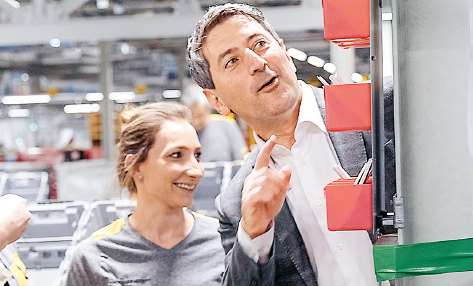
The CEO on a delivery round. In all kinds of weather, just like the delivery staff.
“We want to continue to provide Switzerland’s universal service without external financing.”
Roberto Cirillo has been Swiss Post CEO since April 2019. After an intensive initial period of familiarization, strategy development is now on the agenda. What are the challenges? And where might the journey be heading?
You took over as CEO in April. Maybe we should begin by discussing how you felt about your first few weeks?
For me, it was important to quickly get a picture of Swiss Post’s many facets and its various business areas. So I had procedures explained to me on the ground, lent a hand and talked to a lot of employees at all levels. I was surprised by how multifaceted the Group is. But I have to say that there’s a good reason why we were named as the world’s best postal service by the Universal Postal Union for the third time running.

Roberto Cirillo gains an insight into Swiss Post.
Does this award mean that Swiss Post is also more successful economically than other postal organizations? How would you summarize the past financial year for Swiss Post?
We are certainly one of the most economically successful postal companies. But the award involves many criteria. As for Swiss Post’s financial year in 2019, we have to be aware that the company is in a challenging situation. The general conditions for economic success have seriously deteriorated. As a result, our 2019 result is again down year-on-year.
What are those conditions?
Primarily the decline in letter volumes at PostMail and the low interest rates at PostFinance. We will not be able to reverse the trend of declining letter volumes. But thanks to intensive efforts, the result has not declined to the same extent as the deterioration in general conditions.

What goes into which box? Order is key, even inside the box.
So what’s to be done?
To begin with, sound analysis. We have conducted a holistic analysis of Swiss Post. We have examined all units, the markets in which they operate and the interactions between the units. This allowed us to identify the main challenges facing Swiss Post, which the new strategy for the future direction of the company must address.
What are those challenges and what is the strategy?
We will present the strategy to our owner in spring 2020, and only afterwards to the public. But the challenges are clear: there are essentially two. One is digitization. This is giving rise to new possibilities, but also changing habits in society, and we have to respond to these changes. At Swiss Post, we guarantee the secure, reliable and confidential transport of information. In 15 years’ time, this transport will mainly be digital. As a communications company, we are adapting our services accordingly for our customers.
Swiss Post guarantees the secure and reliable transport of information.

A stairway is no obstacle to reaching our customers every day.
And the other?
The changes in the logistics sector. We are the logistics backbone of Switzerland. Digital commerce, and online retail on mobile devices in particular, is increasing customers’ demands and expectations enormously. They expect fast delivery. And for impulse purchases especially, preferably on the same day. If we take proper advantage of the opportunities offered by digitization and logistics, we will make a huge contribution to the Swiss economy.
How are you tackling the challenges in logistics?
We have to create the capacities we need to handle the growing parcel volumes. To do that, we have established regional distribution centers in Ticino, Graubünden and Valais. These will be the basis for new services that will allow us to offer nationwide same-day delivery. However, there is another challenge in this sector that is somewhat more complex: the last mile. In cities in particular, our network needs more diversification than at present. We need logistics platforms. And maybe then we will see bike couriers delivering parcels and goods over the last mile.

The CEO is impressed with his employees’ enthusiasm.
Will the challenges in logistics be completely resolved with more diversification of the network?
No. We also need to establish logistics chains abroad. And also from other countries to Switzerland. For trade with China, we have established the “Gateway to China” for Swiss SMEs. Of course, global trade is not limited to a Switzerland-China axis. So we also need to create gateways to other countries and regions, so that Switzerland can continue to ensure its economic independence in the future.
What about the declining letter volumes? Will there soon be no more letters?
Letters will certainly not disappear completely. In the future, information will increasingly be exchanged in digital formats. Volumes will therefore be significantly lower. And a logical consequence of this is that we have to adapt our services to these changing needs and our work processes to the reduced volumes. Here again, we are looking at the Swiss Post system holistically.
Will there be a price increase?
In the past 15 years, the price of transporting letters has not increased by a single centime. That’s a very long time, and we will certainly have to discuss a price increase. But this requires a constructive dialogue. For Swiss Post, there is a bigger issue: as a company, we need flexibility and entrepreneurial freedom.
Where are there other opportunities for Swiss Post?
With our delivery staff and the branch network, we are particularly close to people. And the branch network in particular could be vitalized and stabilized with services. Most service companies focus on online business, but there are people who want and seek out human contact. Offering everything online only discriminates against people who cannot or do not want to be online. With our employees in our branches, we have the ability to create added value and meet people’s needs.
Our employees enjoy a very high level of trust.

The meticulous organization of the letter sorting system is impressive.
What services might these be?
Our employees are very competent and have in-depth knowledge of our range of services. Their training is excellent. They also enjoy a very high level of trust. Tests in Western and Central Switzerland using health insurance providers as an example have shown that our employees are also able to perform services such as providing information and explanations for insurance products, and that this creates added value for our customers.
Another issue is PostFinance. What is the situation with the ban on mortgage lending?
PostFinance cannot take full advantage of its potential as a bank. The ban on issuing loans and mortgages means that it is actually only half a bank. In the current negative interest rate environment, this model has no future and therefore requires further development. I am confident that the decision-makers recognize very clearly how important this step is. However, even if the ban is lifted, it is clear that Swiss Post will no longer receive dividends from PostFinance at the same levels as in the past.
Would partial privatization be a practicable way of lifting the ban in your view?
The key question is not who owns PostFinance, but rather how we can put PostFinance on a stable and sustainable course. This is important for Swiss Post as a whole, because we want to continue to pay for the universal service ourselves in the future. Whatever happens, we will take the necessary measures to ensure PostFinance’s stability.
What about the question of climate policy at Swiss Post?
We are aware that we must act as a role model in this issue. As the biggest logistics group in Switzerland, we also have the largest fleet of vehicles. We are the only postal organization in the world that delivers two billion letters almost entirely with electric vehicles. We use 6,000 electrically powered three-wheeled vehicles, all of which run on eco-electricity. Our whole delivery fleet consists of 11,000 vehicles. The goal is to run this fleet entirely on fossil-free fuel by 2030.
We are aware that we must act as a role model.

We need to look far into the future: for a relevant and sustainable Swiss Post.
Finally, a question on diversity. Can 56,000 very different employees convey a consistent image of Swiss Post?
With around 56,000 employees, we do of course have a diverse and multicultural workforce at all levels within Swiss Post. And that’s good. We need that. Employees with different languages and different approaches to life. After all, our customers are not all the same, either. So we need to harness our employees’ diversity to better understand and serve our customers’ diversity.